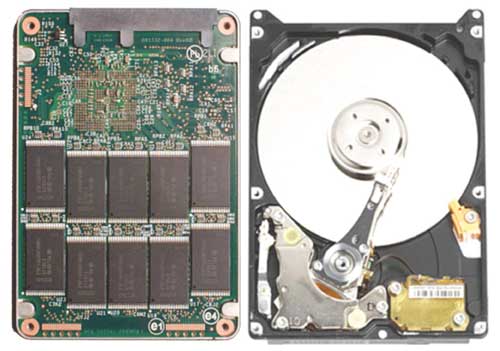.jpg)
These days, most people buying laptops as their primary computers need to decide between getting Solid State Drives (SSD) or Hard Disk Drives (HDD) as the storage component. Which is better? There’s no straightforward answer; each buyer has different needs and you have to evaluate your needs, preferences, and of course, your budget. Though the price of SSDs has been falling, the price per gigabyte advantage is still strong with HDDs. Yet, if performance and fast boot-up are your primary considerations, then SSD is the way to go.
What is an SSD?
SD stands for Solid State Drive. Like a memory stick, there are no moving parts to an SSD. Rather, information is stored in microchips. A hard drive, by contrast, uses a mechanical arm with a read/write head to move around and read information from the right location on a storage platter. (think- record player). This difference is what makes SSD so much faster.
A typical SSD uses NAND-based flash memory. This is a non-volatile type of memory. Non-volatile means that you can turn off the disk and it won’t “forget” what was stored on it. This is of course an essential characteristic of any type of permanent memory. During the early days of SSD, rumors floated around saying stored data would wear off and be lost after only a few years. Today this is not true; you can read and write to an SSD all day long and the data storage integrity will be maintained for years.
An SSD does not have a mechanical arm to read and write data, it instead relies on an embedded processor (or “brain”) called a controller to perform a bunch of operations related to reading and writing data. The controller is a very important factor in determining the speed of the SSD. Decisions it makes related to how to store, retrieve,cache and clean up data can determine the overall speed of the drive.
What is an HDD?
Hard Disk Drives, HDDs, use magnetics to store data on a rotating platter. A read/write head floats above the spinning platter and reads and writes data. The faster the platter spins, the faster an HDD can perform. Typical laptop drives today spin at either 5400 RPM (Revolutions per Minute) or 7200RPM. The major advantage of an HDD is that it is capable of storing data more cheaply.The cost for a typical 500GB hard drive is around $50; The cost for a 480GB SSD is around $410.
When it comes to appearance, HDDs and SSDs essentially look the same from the outside. HDDs predominantly use SATA interface. The most common size for laptop hard drives is the 2.5” form while a larger 3.5” form is used in desktop computers. The larger size allows for more platters inside and thus more storage capacity.
Today it still makes sense for a majority of typical buyers just to get a laptop with an HDD simply because it’s cheaper. However, if you are willing to pay for faster performance, then of course, SSD is the way to go. Eventually SSD may replace HDD as the standard storage mechanism, certainly in laptops, given the advantages they present for a mobile device. SSDs are already showing up as the default storage device in some Ultrabooks. Manufacturers are beginning to produce laptops with two drive slots, one for a hard drive and the other for SSD which works with hard disk drives to speed up boot and application load times.However, there will always be a market for both HDD and SSDs.
NetworkMasters, LLC provides IT support services to businesses in New York, New Jersey and Connecticut. We specialize in small and midsize companies. Our IT services include network installation, new office setup and relocation, data backup and recovery, network support, remote access, hardware and software upgrades, spam/virus protection, server and network monitoring, telephony and cabling. We also offer customized managed services solutions.
You can reach us at 201.353.7998 or email me directly at haroldn_networkmasters.biz
By Harold Nussbaum










